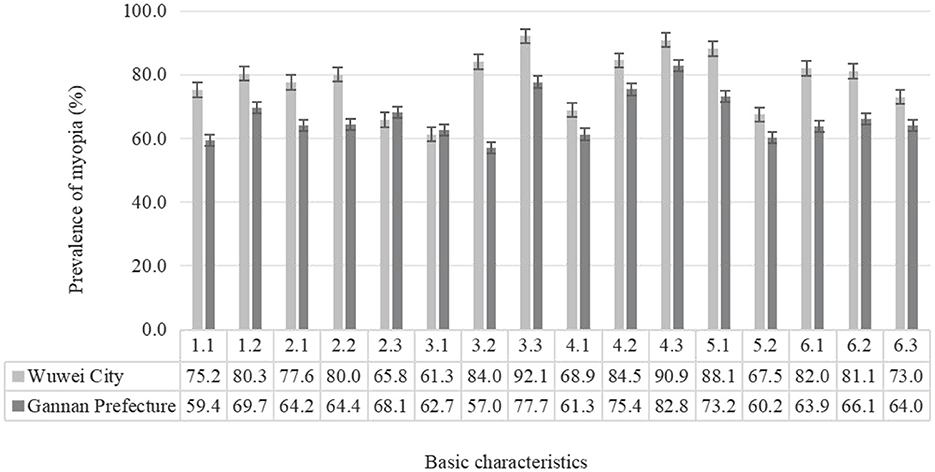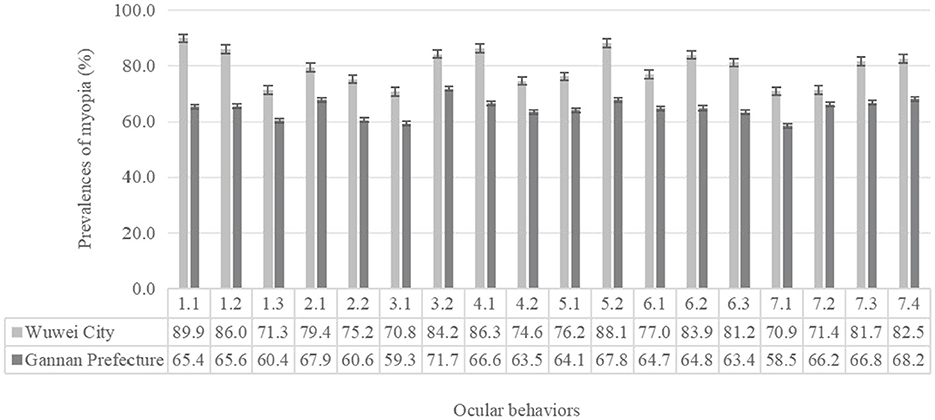Regional disparities in the prevalence and correlated factors of myopia in children and adolescents in Gansu, China
- 1School of Public Health, Lanzhou University, Lanzhou, China
- 2Department of Public Health, Lanzhou Second People's Hospital, Lanzhou, China
- 3Department of Ophthalmology, Baiyin Second People's Hospital, Baiyin, China
A Corrigendum on
Regional disparities in the prevalence and correlated factors of myopia in children and adolescents in Gansu, China
by Wang, J., Li, S., He, S., Feng, Y., and Li, P. (2024). Front. Med. 11:1375080. doi: 10.3389/fmed.2024.1375080
In the published article, there was an error in Figures 1, 2. Figures 1, 2 had the text of the variable names incorrectly adjusted. These variables are now explained in the footnotes of the tables. The corrected Figures appear below.

Figure 1. Prevalence of myopia of different basic characters students in the two regions (%). 1.1, Boys; 1.2, girls; 2.1, ethnic han; 2.2, Tibetan; 2.3, other ethnic; 3.1, elementary; 3.2, junior; 3.3, senior; 4.1, no parental myopia; 4.2, father or mother with myopia; 4.3, parents with myopia; 5.1, average daily sleep duration < 8 h; 5.2, average daily sleep duration ≥ 8 h; 6.1, daytime outdoor activity < 1; 6.2, daytime outdoor activity 1–2 h; 6.3, daytime outdoor activity ≥ 2 h.

Figure 2. Prevalence of myopia of different ocular behaviors students in the two regions (%). 1.1, doing eye exercises 0 time/d; 1.2, doing eye exercises 1 time/d; 1.3, doing eye exercises ≥ 2 times/d; 2.1, recess in the teaching building; 2.2, recess outdoor; 3.1, daily time spend doing homework < 2 h; 3.2, daily time spend doing homework ≥ 2 h; 4.1, distance between eyes book less than one foot; 4.2, distance between eyes book more than one foot; 5.1, reading occasionally while reclined or lying down; 5.2, reading always while reclined or lying down; 6.1, daily time spend using computer < 1 h; 6.2, daily time spend using computer 1–2 h; 6.3, daily time spend using computer ≥ 2 h; 7.1, mean time continuous eye use < 0.25 h; 7.2, mean time continuous eye use 0.25–0.5 h; 7.3, mean time continuous eye use 0.5–1 h; 7.4, mean time continuous eye use ≥ 1 h.
The authors apologize for this error and state that this does not change the scientific conclusions of the article in any way. The original article has been updated.
Publisher's note
All claims expressed in this article are solely those of the authors and do not necessarily represent those of their affiliated organizations, or those of the publisher, the editors and the reviewers. Any product that may be evaluated in this article, or claim that may be made by its manufacturer, is not guaranteed or endorsed by the publisher.
Keywords: children and adolescents, myopia, influencing factors, regional disparity, prevention and control
Citation: Wang J, Li S, He S, Feng Y and Li P (2024) Corrigendum: Regional disparities in the prevalence and correlated factors of myopia in children and adolescents in Gansu, China. Front. Med. 11:1487929. doi: 10.3389/fmed.2024.1487929
Received: 29 August 2024; Accepted: 30 August 2024;
Published: 17 September 2024.
Edited and reviewed by: Claudia Carolina Cruz-Gálvez, University of Guadalajara, Mexico
Copyright © 2024 Wang, Li, He, Feng and Li. This is an open-access article distributed under the terms of the Creative Commons Attribution License (CC BY). The use, distribution or reproduction in other forums is permitted, provided the original author(s) and the copyright owner(s) are credited and that the original publication in this journal is cited, in accordance with accepted academic practice. No use, distribution or reproduction is permitted which does not comply with these terms.
*Correspondence: Jinyu Wang, MjQyMTU0ODY1NkBxcS5jb20=; Sheng Li, MTE3ODcwODQwN0BxcS5jb20=
 Jinyu Wang
Jinyu Wang Sheng Li2*
Sheng Li2*